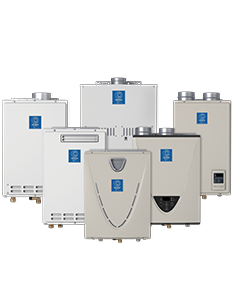 Tankless water heaters are an increasingly popular alternative to traditional hot water tanks for the home. In fact, sales of tankless water heaters are expected to grow over 7% annually between 2018-2022. If you’re in the market to replace your home’s water heater, you need to inform yourself about today’s tankless options. That’s why we’ve created a handy guide.
Tankless water heaters are an increasingly popular alternative to traditional hot water tanks for the home. In fact, sales of tankless water heaters are expected to grow over 7% annually between 2018-2022. If you’re in the market to replace your home’s water heater, you need to inform yourself about today’s tankless options. That’s why we’ve created a handy guide.
What is a tankless water heater?
If you hadn’t guessed by the name, a tankless water heater produces hot water for the home without having to store it in a 40-50 gallon tank. Water is heated on demand through either a gas burner or electric coils.
Pros
Tankless water heaters offer the following advantages over traditional models:
- Higher energy efficiency. For moderate hot water users, energy efficiency is increased between 24%-34%. This means less energy waste and more savings on your monthly utility bills.
- More durable. Gas models of tankless water heaters can last over 20 years, which allows the savings on utility bills to add up over time. The electric models don’t fare as well, however, with a lifespan of 7-10 years. This is comparable to a traditional water heater.
- Less chance of a leak. When traditional models spring a leak, the results can be catastrophic. This isn’t the case with tankless models, which don’t store water at all.
- More compact. Tankless water heaters take up significantly less space than their traditional counterparts. They can fit in a relatively small space, whereas hot water tanks require more dedicated space in the garage or basement.
Cons
There are drawbacks to tankless water heaters, such as:
- More expensive. Including the more involved installation process, tankless water heaters can cost up to five times more than traditional units.
- Less hot water output. Cheaper tankless units will only provide enough water for approximately four faucets. This wouldn’t be enough to take a shower while the dishwasher is running, for instance. This can be offset by installing multiple units, but the cost would rise.
- Sensitive to low flow. If sediment builds up in your pipes or showerheads and flow is significantly restricted, tankless water heaters are programmed to shut down automatically.
New technological advancements
The technology behind tankless water heaters has been advancing quickly. Nowadays, you can find consumer models that sport:
- Recirculation pumps. Pumps that can be scheduled to run on a timer or motion sensor circulate the cold water left in your pipes back to the heater. This keeps the water in your pipes warm, meaning you can have nearly instant hot water.
- Ultra-high energy efficiency. There are now condensing gas heaters that convert their fuel to energy at a 96% rate. This kind of efficiency was unheard of in the past.
- Wi-Fi connectivity. Some tankless models can be connected to your Wi-Fi network and controlled through an application on your phone. You can tweak settings as needed to increase overall efficiency and performance.
Bieg Plumbing has operated in the St. Louis area for nearly 60 years. We’ve got master plumbers with experience in tankless and traditional water heaters, and would be happy to discuss your options in greater depth. Contact us today to talk about tankless water heaters or any plumbing needs.


